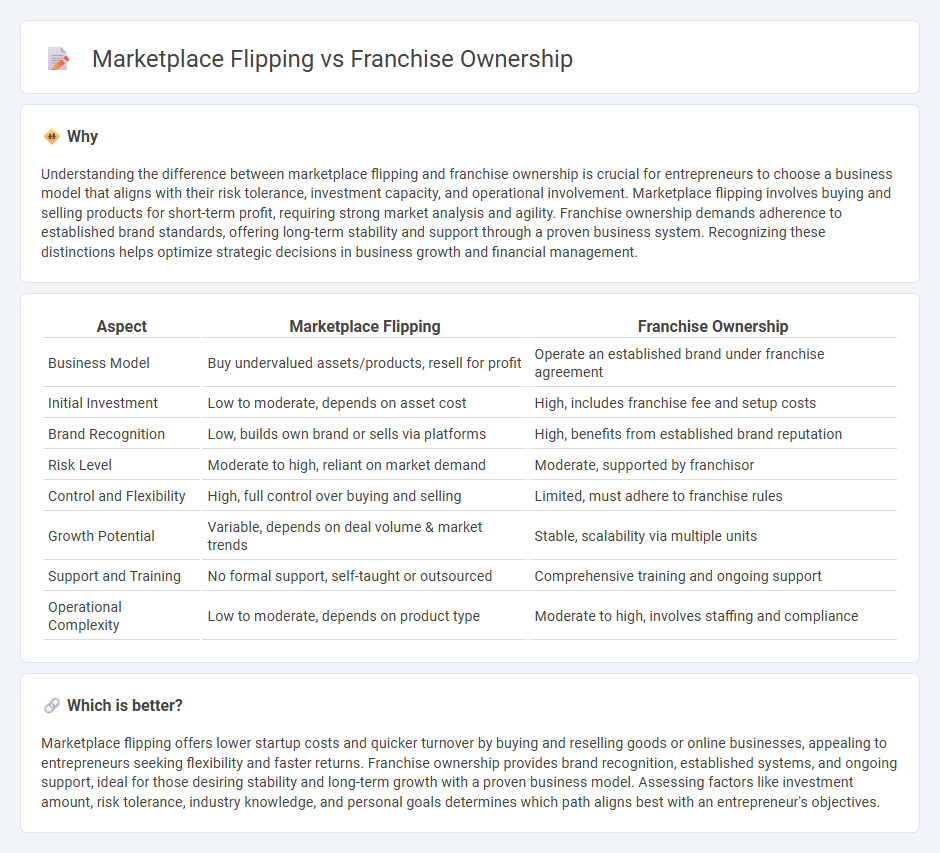
Marketplace flipping involves buying undervalued products or businesses to resell them at a profit, leveraging market trends and negotiation skills for quick returns. Franchise ownership requires investing in an established brand with a proven business model, offering stability and support but often demanding higher initial capital and ongoing fees. Explore the advantages and challenges of each to determine which entrepreneurial path aligns best with your goals.
Why it is important
Understanding the difference between marketplace flipping and franchise ownership is crucial for entrepreneurs to choose a business model that aligns with their risk tolerance, investment capacity, and operational involvement. Marketplace flipping involves buying and selling products for short-term profit, requiring strong market analysis and agility. Franchise ownership demands adherence to established brand standards, offering long-term stability and support through a proven business system. Recognizing these distinctions helps optimize strategic decisions in business growth and financial management.
Comparison Table
| Aspect | Marketplace Flipping | Franchise Ownership |
|---|---|---|
| Business Model | Buy undervalued assets/products, resell for profit | Operate an established brand under franchise agreement |
| Initial Investment | Low to moderate, depends on asset cost | High, includes franchise fee and setup costs |
| Brand Recognition | Low, builds own brand or sells via platforms | High, benefits from established brand reputation |
| Risk Level | Moderate to high, reliant on market demand | Moderate, supported by franchisor |
| Control and Flexibility | High, full control over buying and selling | Limited, must adhere to franchise rules |
| Growth Potential | Variable, depends on deal volume & market trends | Stable, scalability via multiple units |
| Support and Training | No formal support, self-taught or outsourced | Comprehensive training and ongoing support |
| Operational Complexity | Low to moderate, depends on product type | Moderate to high, involves staffing and compliance |
Which is better?
Marketplace flipping offers lower startup costs and quicker turnover by buying and reselling goods or online businesses, appealing to entrepreneurs seeking flexibility and faster returns. Franchise ownership provides brand recognition, established systems, and ongoing support, ideal for those desiring stability and long-term growth with a proven business model. Assessing factors like investment amount, risk tolerance, industry knowledge, and personal goals determines which path aligns best with an entrepreneur's objectives.
Connection
Marketplace flipping and franchise ownership are connected through their focus on leveraging established brands and assets to generate profits with reduced startup risks. Both strategies involve acquiring undervalued or operational entities, then optimizing or scaling them for increased market value and revenue. Entrepreneurs use marketplace flipping to gain capital and experience, which can facilitate franchise ownership as a scalable, systematized business model.
Key Terms
Business Model
Franchise ownership offers a proven business model with established brand recognition, operational support, and a structured revenue stream, reducing the risks associated with startup ventures. Marketplace flipping involves buying and reselling products or businesses for profit, requiring keen market insight, negotiation skills, and agility to capitalize on fluctuating demand. Explore detailed comparisons to determine which business model aligns best with your investment goals and risk appetite.
Revenue Stream
Franchise ownership generates consistent revenue streams through established brand recognition, proven business models, and ongoing franchisor support, leading to predictable monthly income and long-term growth potential. Marketplace flipping relies on buying undervalued assets or products and reselling them at higher prices, creating variable income dependent on market trends and negotiation skills. Explore detailed revenue comparisons and strategies to optimize your investment returns.
Level of Control
Franchise ownership offers a high level of control with standardized systems, brand recognition, and operational support, ensuring consistent performance and risk mitigation. Marketplace flipping provides more flexibility but less control over product sourcing, pricing, and customer experience, leading to variable profit margins and operational risks. Discover which model suits your entrepreneurial goals by exploring their control dynamics in detail.
Source and External Links
A Consumer's Guide to Buying a Franchise - Franchise ownership means operating a business using a franchisor's system and brand, requiring payment of an initial franchise fee, ongoing royalties, and adherence to franchisor controls and contractual obligations, alongside receiving training and support from the franchisor.
What does a franchise owner do? - CareerExplorer - A franchise owner manages daily operation, staffing, finances, and compliance of one or more franchise locations, leveraging a recognizable brand and business model for entrepreneurial venture.
What is a Franchise Owner & How Do I Become One? - AtWork - Franchise owners fund and run local franchise locations, combining established brand advantages with responsibilities such as operations management, local marketing, staffing, and financial oversight to ensure the business's success.
 dowidth.com
dowidth.com